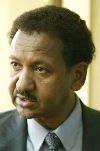Despite criticism, Sudan says has met UN demands
By Nima Elbagir
 KHARTOUM, Sept 2 (Reuters) – Sudan said on Thursday it had largely complied with U.N. demands to restore security to its Darfur region, despite U.N. chief Kofi Annan expressing disquiet that most militia had still not been disarmed.
KHARTOUM, Sept 2 (Reuters) – Sudan said on Thursday it had largely complied with U.N. demands to restore security to its Darfur region, despite U.N. chief Kofi Annan expressing disquiet that most militia had still not been disarmed.
The Sudanese government’s optimism that it will escape sanctions came as rebels appeared to step back from an agreement on humanitarian access in Darfur at two-week-old peace talks with government representatives in Abuja, Nigeria.
At the United Nations, U.S. officials accused Khartoum of playing a direct role in attacks on African villagers in Darfur and criticised what they said was the U.N.’s failure to emphasise the government’s involvement in the crisis.
Under a July 30 resolution, the United Nations gave Sudan until Aug. 30 to make substantial efforts to rein in marauding Arab militias, known as Janjaweed, and improve aid access to more than a million people displaced by fighting in Darfur.
“The obligations which the government of Sudan was asked (to do), we already fulfilled it maybe by more than 70 to 80 percent, so it will be very difficult even for those who … want to condemn … Sudan. They will find it difficult to ignore these achievements,” Foreign Minister Mustafa Osman Ismail told reporters in Sudan.
After years of low-level conflict between Arab nomads and African farmers, rebels launched a revolt last year accusing the government of arming the Janjaweed to loot and burn African villages.
Sudan admits arming some militias to fight the rebels, but denies any link to the Janjaweed, whom it calls outlaws. The fighting has triggered what the U.N. calls one of the world’s worst humanitarian crises, killing up to 50,000 people.
DIRECT GOVERNMENT INVOLVEMENT
U.N. Secretary-General Annan said on Wednesday Khartoum had failed to stop attacks against civilians and “the vast majority of armed militias has not been disarmed”.
In a report to the U.N. Security Council, Annan conceded that making an area about the size of France safer would take more than 30 days, but he said the United Nations continued to received reports of militia activities in Darfur.
U.S. Ambassador John Danforth said 25 percent of Darfur refugees surveyed recently by U.S. officials in neighbouring Chad reported they had been “attacked exclusively” by the Sudanese military. Another 50 percent said the attacks came from the government working with the militia.
The African Union has deployed more than 100 monitors to observe a shaky April ceasefire with rebels in Darfur and 300 troops, mandated only to protect the observers.
In his report, Annan said “a substantially increased international presence” was needed quickly in Darfur to improve the protection of the civilian population and decrease the level of violence.
Ismail said: “The government of Sudan is open for anything that could help bring peace and security in Darfur.”
In the past Sudan has said it would limit the role of AU troops to protecting monitors or disarming rebels, not allowing them to be peacekeepers.
The top U.N. envoy in Sudan, Jan Pronk, briefed the Security Council on Thursday in a closed session. An open debate is expected next week.
Ismail said he thought the result would be balanced.
“My expectation is that the resolution will try to balance between what has been achieved by the Sudanese government, which is irrefutable, and the pressures being exerted by certain groups for the condemnation of the… government,” he said.
The United Nations and leading aid groups said the world had to act quickly to stop greater suffering in Darfur.
“There is a real narrowing of the food, medicine and water pipeline that has to be expanded in the coming weeks or things will go from bad to worse,” said Charles MacCormack, president of Save the Children.
At peace talks in Abuja on Thursday, Darfur rebels demanded the prosecution of Janjaweed militia and a no-fly zone over their territory before they will sign any deal addressing the humanitarian crisis.
Rebels and the government adjourned on Thursday and were set to reconvene on Saturday. Rebels and government accuse each other of mutual ceasefire violations. Rebels say they refuse to consider disarmament until the Janjaweed are fully reined in.
(Additional reporting by Tume Ahemba in Abuja)
